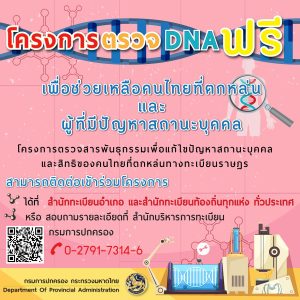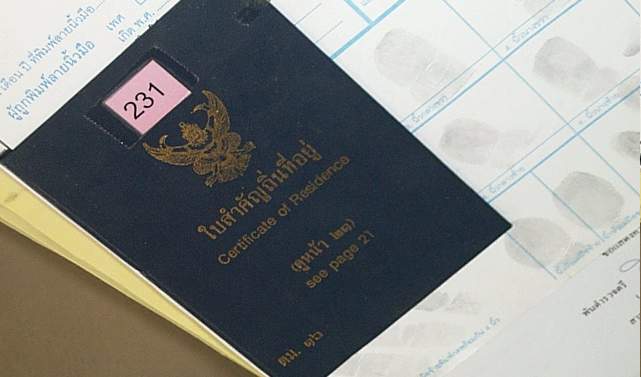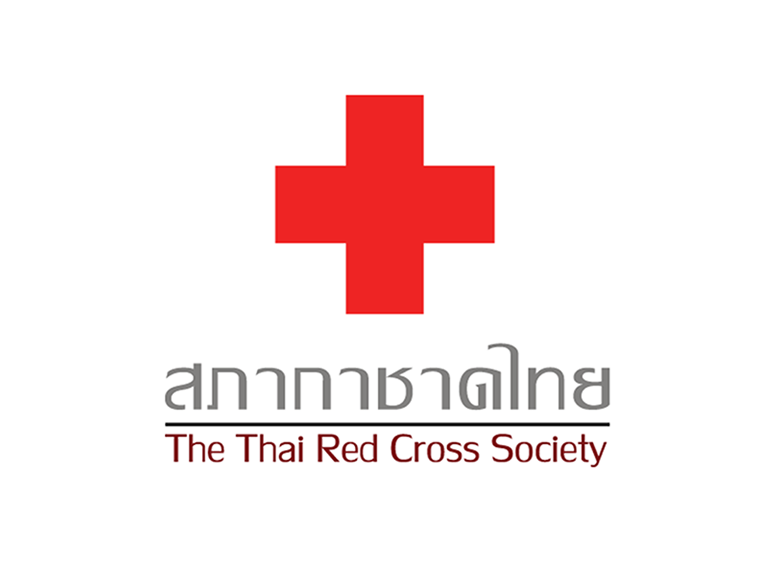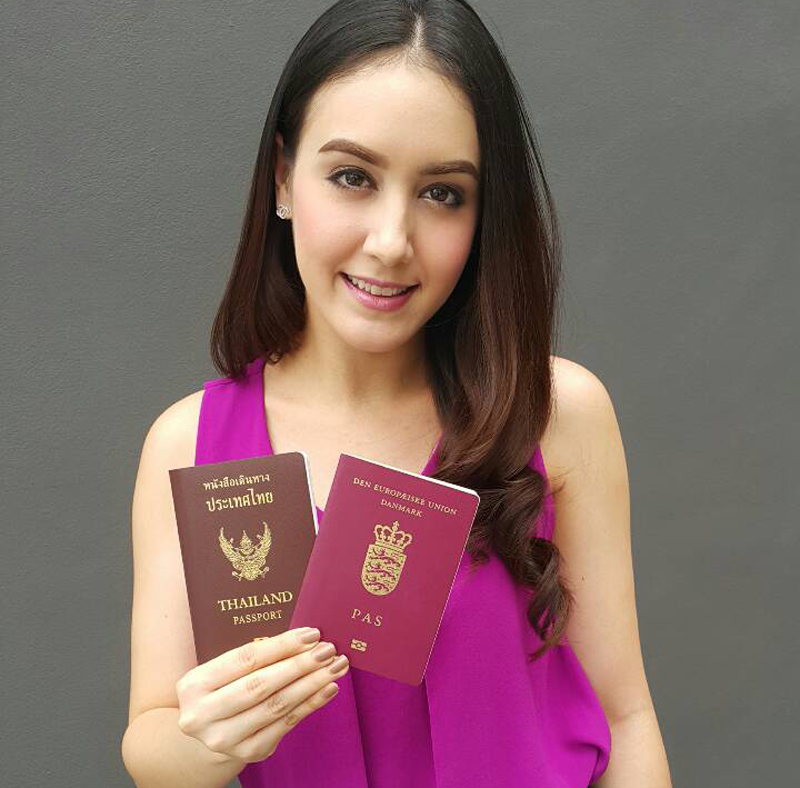DNA Testing to prove one’s right to Thai citizenship is quickly becoming a well-accepted method for those who struggle with Thai bureaucracy when attempting to claim their Thai citizenship.
There are a number of routes to Thai citizenship, either via naturalization or being born to a Thai parent.
For those in this latter category, obtaining Thai citizenship should normally relative straight forward matter.
If born in Thailand to a Thai parent, a birth certificate is usually marked at the top indicating the child is ‘Thai’. For those born overseas to at least one Thai parent, then the Thai embassy in the country they are born in will normally, without fuss, issue that child with a Thai birth certificate, which will serve as the foundation document to prove their Thai nationality for the rest of their life.
We’ve written about these standard paths here and for most people these paths suffice.
On not so rare occasions however, children of Thai citizens do struggle to put together the paperwork necessary for proving they have a right to Thai citizenship. This can be for many reasons, including (but not limited to):
- The Thai parent having migrated away from Thailand so long ago they don’t have (and easily can’t get back) the required documentation needed for their children to be registered as a Thai citizen. This documentation includes Thai House Registration – the ‘tabien baan’ (ทะเบียนบ้าน), a Thai passport (หนังสือเดินทาง) or Thai ID card (บัตรประชาชน);
- The Thai parent has died before registering their child as a Thai national, not leaving the required documentation behind;
- The Thai embassy a particular country cannot, or won’t, recognize birth documentation provided at the time of birth from that country’s authorities (its rare but happens); and
- A person being born outside of Thailand before 1 March 1992 to an unmarried Thai father and foreign mother not being able to meet the requirement to have BOTH parents attend, in person the embassy to report the birth (as outlined here).
Whatever the reason, the ‘standard’ path of proving your Thai citizenship via the paperwork route, isn’t going to pan out.
Fortunately in recent years a new path has developed, which should serve many who find themselves in that situation.
Thai citizenship is based on blood
Literally. Unlike many countries where birth on a country’s soil (or to use the Latin phrase “jus soli”) automatically grants you citizenship, Thailand doesn’t use that approach. In the case of Thailand, citizenship by birth is “jus sanguinis” (by the right of blood). It means the right to Thai citizenship is through one’s bloodline. As an added bonus, under current Thai legislation, it is passed down on an indefinite basis – regardless of where children and grand-children (and great-great children etc) are subsequently born.
The fact that Thailand frames the issue of inheriting citizenship in this way means that for those who lack the actual documentation to prove their parent is a Thai citizen, then DNA can be used as an alternative to show proof of a relationship.
DNA Testing to prove Thai citizenship (ตรวจสารพันธุกรรม DNA ขอสัญชาติไทย)
In recent years, progress in DNA technology, as well as active Thai government initiatives to help poor stateless and undocumented people in Thailand cement their claim to Thai nationality, mean that there are now regularized routes for everyone who has had issues proving their Thai citizenship via the traditional paths.

The Thai government now will allow a person looking to prove their entitlement to Thai citizenship do so via proving a link to a close blood relative who already has Thai citizenship. This can include your own Thai parent as well as a close blood relative (i.e. aunt, uncles or siblings).
Where to apply?
At this stage, we understand that this can only be done in Thailand, as the process requires DNA testing to be done by an approved Thai government hospital.
You can apply at the local district office where one of your relatives is registered. The official at the district office will officially make an application to put your name on the house registration and then also issue a letter to relevant authorities ordering a DNA test to prove your genetic relationship to a registered Thai citizen.
You can then take this letter to a registered government hospital that has been approved for DNA testing. Both you and your close Thai relatives will need to provide saliva samples.
Following this there will likely be a wait of a number of weeks for the results to be processed, but once done, you will be sent an official report (hopefully) confirming your relationship.
You then take this report back to the district office where the officer in charge will put together a file to give to the head of the head of the district office (นายอำเภอ) for consideration and approval.
Depending on the district office this process may involve interviews with you and your DNA matched relative, as well as (it seems at their discretion) the head of the household in charge of your tabieen baan (เจ้าบ้านทะเบียนบ้าน) as well as any other Thai citizen witnesses to vouch for the authenticity of the application (but don’t worry, getting Thai citizens to vouch for you is very common in many Thai administrative functions).
In more remote areas, there may be the need to bring in the village chief (กำนัน/ผู้ใหญ่บ้าน) particularly if registering in rural part of Thailand.
Once approved, the head of the district office (นายอำเภอ) should then be able to sign off on the application to enter you on the house registration.
Once done, you are then registered as a Thai citizen and can immediately have your ID card issued.
What documents do I need?
As with most things in Thailand, at a district office level, there may be a level interpretation of what documents that might be needed. But you will likely need to provide the following:
- A copy of your foreign passport and birth certificate translated into Thai and certified by the Thai Ministry of Foreign Affairs;
- Four passport sized photos of the applicant;
- Copies of your parents identification with their names translated into Thai;
- Any old Thai ID of your parents (including old or expired ID cards, house registrations)
- Marriage certificates of applicant (if applicable) and of Thai parent
- Death certificates of your Thai parent (if applicable)
- The ID of nominated Thai relative who will be providing the DNA match, including the ‘tabien baan’ (ทะเบียนบ้าน) and Thai ID card (บัตรประชาชน)
- Results of the DNA test from a registered Thai hospital approved for DNA testing
- Birth certificates of any Thai citizen siblings (if applicable)
- ID and house registration of two Thai citizen witnesses
- You may be asked for any naturalisation certificates of your Thai parent in the event they took up the citizenship of the country they migrated to.
What are some issues that might pop up?
In Thailand, when documents are processed at a national level, or even just in Bangkok and other big cities like Chiang Mai, things tend to be a bit more predictable give the agencies and officers involved tend to be a bit more familiar with the rules and procedures.
But because you are dealing with a district office here (the equivalent of a ‘city hall’ in the US), lets just say the calibre and the motivation of the staff there may be a bit lower than those in built up areas. As a general rule, the more remote the district office, the longer the process will take (though there will be exceptions).
In a district office where this process hasn’t been done before, the most likely scenario is that the desk officer who you deal with will be unfamiliar with the process, even though the government has issued official notices to them regarding the issue (see here as an example).
You might experience some initial push back, and it is really important that you push them to reference their own guidelines on this (ie to for them to ‘do their jobs’).
Another issue which might arise is the district office being slow to process the documentation due to ‘sign off’ delays. It is not uncommon to hear that the head of the district office (นายอำเภอ) is out at training/a meeting/down in Bangkok and hasn’t had time to look at the file to approve it.
These excuses aren’t isolated to this process. In fact many Thai people who need administrative work done at a district office, especially when the issue is relatively unique, will come across this excuse.
(To be fair to the district officers, their reluctance to process applications generally stems from their sensitivity in approving anything to do with citizenship, given there have been many instances of district officials who have illegally given Thai ID’s to foreigners and have subsequently been prosecuted).
So patience, but regular persistence in following up with the district office should win out, meaning you’ll finally be recognized as a Thai citizen.
Who are acceptable relatives for DNA testing?
The following translated list is from the Forensic Clinic at the Division of Forensic Science Services, Central Institute of Forensic Science, outlines the acceptable (and unacceptable) relationships from which an applicant can test their relationship with a Thai citizen.
| No. | Type of Family Relationship | DNA Testing |
| 1 | Father – mother with children | Testing possible |
| 2 | Brothers-sisters with the same father and mother | Testing possible |
| 3 | Brothers-sisters with only the same mother | Testing possible |
| 4 | Brothers with only the same father (male and male) | Testing possible |
| 5 | Sisters with only the same father (female and female) | Testing possible |
| 6 | Brothers-sisters with the same father (different sexes) | Testing not possible |
| 7 | Brothers-sisters of mother (uncles/aunts) with nephews and nieces | Testing possible |
| 8 | Brothers (male) of father with nephews (male) | Testing possible |
| 9 | Brothers (male) of father (uncles) with nieces (female) | Testing not possible |
| 10 | Sisters (female) of father (aunts) with nephews and nieces (male-female) | Testing not possible |
| 11 | Grandfather (mother’s father) with grandchildren | Testing not possible |
| 12 | Brothers-sisters (male-female) of grandfather (mother’s father) with grandnephews and grandnieces (male-female) | Testing not possible |
| 13 | Grandmother (mother’s mother) with grandchildren | Testing possible |
| 14 | Brothers-sisters (male-female) of grandmother (mother’s mother) with grandnephews and grandnieces (male-female) | Testing possible |
| 15 | Grandfather (father’s father) with grandson (male) | Testing possible |
| 16 | Grandfather (father’s father) with granddaughter (female) | Testing not possible |
| 17 | Brothers (male) of grandfather (father’s father) with grandnephews (male) | Testing possible |
| 18 | Brothers (male) of grandfather (father’s father) with grandnieces (female) | Testing not possible |
| 19 | Sisters (female) of grandfather (father’s father) with grandnephews and grandnieces (male-female) | Testing not possible |
| 20 | Grandmother (father’s mother) and grandsons (male) | Testing not possible |
| 21 | Grandmother (father’s mother) and granddaughter (female) | Testing possible |
| 22 | Brothers-sisters (male-female) of grandmother (father’s mother) with grandnephews and grandnieces (male-female) | Testing not possible |
Note:
- To calculate statistical value in the DNA testing of the relationship of brothers and sisters, the father or the mother should also undergo the testing for comparison, which would increase the statistical value to above average. In the case of only brothers and sisters being present, the resulting calculations would give the value in the range from low to above the average, and the case would depend on the characteristics of the genetics of each person being tested and compared.
- In the DNA testing in the case of grandmother (father’s mother) and granddaughter (female), more than one method of testing would be necessary. If the results do not conflict, there can be three interpretations: there is no conflict in the relationship of grandmother and granddaughter, or being an offspring of the same father, or in being a blood cousin, which cannot be summarized into one case (scenario) from just DNA testing, but must consider other evidence over and above the biological evidence discovered.
Ref. the Biological Forensic Group Book No. Yor Thor 1002.07/113 Sor Vor 29 March B.E.2560 (2017)








Help I’m 41 UK Born Half Thai Half English. Thai mother British Father. My father is now resident in Rayong and my mother resident in the UK. Where do I start? I’m flying out to Thailand next month with my mother and meeting my father in BKK in the attempted to go to the Thai Embassy. Any help would be appreciated both are old and want this done before anything happens. Documents I have so far is Birth Cert and passport for British Father. Mother she had UK passport and Thai ID. Myself I have UK passport UK birth cert including my parents marriage certificate. Thank you in advance. I also only have 2 weeks in Thailand. From what I have seen both parents have to be present at the Embassy because i was born before 1992.
Hi there,
So not sure if you’ve seen this article: https://www.thaicitizenship.com/thai-citizenship-when-born-overseas/
I realise the Thai embassy in London require both parents to be present if born before 1992, but do ask them what can be done if your father can’t attend. Ask if there is some sort of power of attorney that would be acceptable for him to sign in and be witnessed in Thailand.
If not, then potentially ‘option 2’ outlined in the article above (with your mum present) would probably be the next viable option. You’d need to hit the ground running so day one would be hitting up a relative to make an appointment at whatever district office your mother is registered in so you aren’t wasting time. Hopefully they don’t ask for a DNA test, and if they don’t, I can imagine 2 weeks might just be okay.
But ideally I’d push the Thai embassy in back in London to issue you with a Thai BC and passport if they can (option one in my article) as that will make getting the ID card in Thailand relatively painless.
Where would I go to get my documents approved? There is no problem both parents being in Thailand at the same time as me. My concern is where do I go? I’m sure the Thai embassy won’t even look into this without the documents being Thai approved
Hi Liz. If the embassy isn’t looking promising for you then the district office where your mum is registered is where you want to do ‘option 2’.
Hello, the list on acceptable relatives for DNA testing is confusing to me. I know my only living uncle will not help me but I have a couple of cousins who likely will. They are both females from another brother of my Thai mother. Would they be acceptable based on your understanding of the list? Thank you
Actually, the list doesn’t mention cousins – so the answer is ‘I don’t know’. If your uncle was willing, he’d fall under category 7 of the list: Brother/sister of mother (ie your uncle or aunt) with nephew or nieces (ie you).
Maybe if you can go to the district office with the cousins to see if it’s possible, that might be one option. Ideally, if you could somehow convince your uncle then that would be the safest bet.
The other option if DNA is out of the question, is really just to head back to the hospital where you were born. It is highly likely that the birth was reported to the local district office and the district office would have had a record of your birth. You might need to pay for someone to dig it up however.
Do you have any old documentation from you mum? Any old Thai passports or Thai ID of hers? Can you ask your cousins if she is still registered on the family house book?
https://www.thaicitizenship.com/reclaiming-thai-citizenship/
Hi,
I am looking to reclaim my Thai citizenship and am at a bit of a loss where to begin. My mother is Thai citizen, married my dad who is British and went on to have me and my brother (both of us born in the uk). She didn’t register us at the Thai embassy so neither of us have Thai birth certificates.
I have not seen my mother since I was 5 years old and have no idea where she is, nor do I have any way to contact her (she wouldn’t help me anyway even if there was a way to contact her).
I have my uk birth certificate and my parents marriage certificate. Is there a way to get my Thai citizenship with just these documents?
Thanks,
Shannon
Hi Shannon,
Thanks for your message. So there are three main ways to get your Thai citizenship, which I outline in this article (https://www.thaicitizenship.com/thai-citizenship-when-born-overseas/).
The most common way to do so is via the Thai embassy in the country you were born, however that would need the active participation of your Thai mother which doesn’t appear to be a viable option. The documents you propose won’t be of any use and in addition to he presence, you’d need her Thai documentation as well.
What is left is via the DNA route (to be done in Thailand) and that would require the cooperation of at least one of your mothers close relatives to provide their documents as well as a DNA sample. IF you’ve got access to that then that would be my strong recommendation.
Hope this helps
TC
Hi, my mom is still a Thai Citizen with Thai ID and passport as she refused to give up her Thai Citizen after moved to Malaysia for 40 years after married. Is the DNA blood still requires for me to apply Thai Citizen
If your mum still has current document you can start the process at the thai embassy in KL. Please take a look at this link
https://www.thaicitizenship.com/thai-citizenship-when-born-overseas/
Thank you very much!
Hi, my case is that my grandfather is Thai citizen who was passed away 20 years ago. My father is not Thai whose younger brother and sister are Thai citizens but my father’s mother and his younger brother and sisters’s are different. I want to apply Thai citizenship via my Uncle (my father’s younger brother) by this DNA testing method. That means i want to apply through the above relationship of item 8. Is it possible? Your reply is much appreciate. Thank you!
Hi Ronald,
There is no reason why it wouldn’t be possible, though you’d need the co-operation of your uncle as well as probably needing to educate the district office where he is registered if they haven’t heard of this proceedure (it is fairly new). But by rights, you should be able to do it.
TC
Thank you so much for your information and i will try to talk with my uncle first.
One more question, because my country i was born not in Thailand and my Uncle’s surname is different from mine. Mine is Chinese name. Is it possible to accept? Do you know?
As said earlier it shouldn’t be an issue
Thank you so much! Could you please tell which Chapters or sections of Thai law as you mentioned as per the above so that i can look into in Thai language also ok for me.
Please check closely in the article above. The images and links within the articles to different government notifications are there.
Hi, my mother’s grandmother (my great grandmother) was Siamese/Thai but we don’t know any existing family members there anymore because she then moved abroad with my great grandfather who was not Thai and settled in another country afterwards. Would i still be eligible to get Thai citizenship through DNA testing by any chance? Thank you!
Hi there
So you are really going to have to be able go track down existing relatives who have thai ID cards off the approved list and get an offical test done with them.
It might mean (and this gets complicated) some of your relatives further up the chain first establish their Thai citizenship first and then you prove your link to them later – if that makes sense!